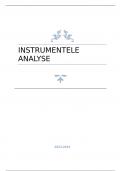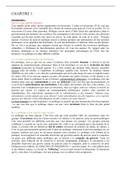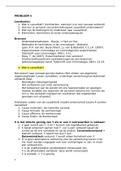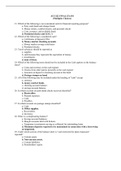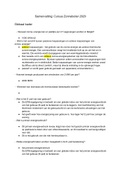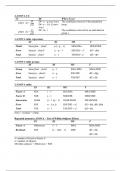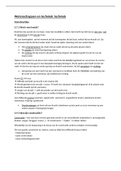Summary International Financial Management
Lecture 1: Why and wherefores
Foreign exchange (FX) risk: An unanticipated movement in the exchange rate can hurt foreign
currency profits or investment returns.
Political risk: Unanticipated changes in laws (e.g. taxes).
Market imperfections: Frictions in the markets for goods and services or in capital markets.
Expanded opportunity set: Potential benefits for firm (markets) and individual investors (increased
investment and diversification opportunities).
Firm goals:
Shareholder value view. (1) Maximization of shareholder value, (2) constrained shareholder value.
Corporate governance
Globalization:
Emergence of globalized markets Emergence of the Euro
Trade liberalization and economic integration Privatization
Multinational corporation (MNC) A firm that is incorporated in one country, but has production and
sales in other countries.
Lecture 2: Some macro facts
Gold standard (1875-1914) Bretton Woods (1945-1973)
Interwar period (1915-1944) Flexible exchange rates (1973-today)
Flexible exchange rates can be good because
o Automatic stabilization of trade imbalances
o National monetary policy remains autonomous
Flexible exchange rates can be bad because
o Exchange rate uncertainty
Balance of payments (BoP): Statistical records of a country’s international
transactions over a certain period of time, presented in the form of
double-entry bookkeeping.
Difference between sales of assets to foreigners and purchases of
foreign assets. Example: foreign direct investment (FDI):
Imports > exports: trade deficit Imports < exports: trade surplus Total debits > total credits:
current account deficit
Current account
BCA + BKA + BRA = 0
Fixed exchange rates: BCA + BKA = - BRA (Therefore: positive BRA = reserves are run down)
Floating exchange rates: BCA + BKA = 0
Dirty floating rates: BCA + BKA ≈ 0
Summary IFM 2016 G. Timmermans 1
, Lecture 3: Governance around the world
Corporate governance: The economic, legal, and institutional framework in which corporate
control and cash flow rights are distributed among shareholders,
managers, and other stakeholders of the company.
1 Public corporation’s structure 2
A public corporation’s pros are (1)
efficient risk sharing, and (2) a major
organizational innovation.
Key objective of corporate governance: protect outside investors from
expropriation by controlling insiders (managers, controlling investors).
Two types of shareholders
Remedies to agency problems: governance mechanisms to alleviate the agency problems
1. Board of directors 4. Accounting transparency 7. Market for corporate
2. Incentive contracts 5. Debt control
3. Concentrated ownership 6. Cross-listing
Common law is formed by the discrete ruling of independent judges and judicial precedent. Civil law
tradition is based on codification of legal rules. Consequences of Law for Finance:
1. The pattern of corporate ownership and control
2. Capital markets development
3. Economic growth
Lecture 4: The FX market, part I
Interbank market is a network of correspondent banking relationships. Large commercial banks maintain
deposit accounts with each other, called correspondent banking accounts.
Spot FX market:
Spot rate quotations
o Ex.: €1 = $1.2: direct quotation (American terms), indirect quotation (European terms)
Bid-ask spreads = difference between:
o Bid price is the price a market maker is willing to pay for a currency
o Ask price is the amount the market maker wants the buyer to pay for the currency
Cross rates
(Triangular) arbitrage (Changing Yen to Dollars, could also do it through Pounds)
Forward FX market
A forward is an agreement to buy or sell an asset in the future at a price agreed upon today
Forward rate quotations
Long and short forward positions
o If you agree to sell (buy) dollars (spot or forward), you are short (long) “in the dollar”
Forward cross exchange rates
o Recall, and note that: S(€/£) = S($/£) x S(€/$) = S($/£) / S($/€)
Forward premium and discount
o Annualized relative deviation from the spot rate (N-O/O. If positive, premium. If negative,
discount).
Summary IFM 2016 G. Timmermans 2
Lecture 1: Why and wherefores
Foreign exchange (FX) risk: An unanticipated movement in the exchange rate can hurt foreign
currency profits or investment returns.
Political risk: Unanticipated changes in laws (e.g. taxes).
Market imperfections: Frictions in the markets for goods and services or in capital markets.
Expanded opportunity set: Potential benefits for firm (markets) and individual investors (increased
investment and diversification opportunities).
Firm goals:
Shareholder value view. (1) Maximization of shareholder value, (2) constrained shareholder value.
Corporate governance
Globalization:
Emergence of globalized markets Emergence of the Euro
Trade liberalization and economic integration Privatization
Multinational corporation (MNC) A firm that is incorporated in one country, but has production and
sales in other countries.
Lecture 2: Some macro facts
Gold standard (1875-1914) Bretton Woods (1945-1973)
Interwar period (1915-1944) Flexible exchange rates (1973-today)
Flexible exchange rates can be good because
o Automatic stabilization of trade imbalances
o National monetary policy remains autonomous
Flexible exchange rates can be bad because
o Exchange rate uncertainty
Balance of payments (BoP): Statistical records of a country’s international
transactions over a certain period of time, presented in the form of
double-entry bookkeeping.
Difference between sales of assets to foreigners and purchases of
foreign assets. Example: foreign direct investment (FDI):
Imports > exports: trade deficit Imports < exports: trade surplus Total debits > total credits:
current account deficit
Current account
BCA + BKA + BRA = 0
Fixed exchange rates: BCA + BKA = - BRA (Therefore: positive BRA = reserves are run down)
Floating exchange rates: BCA + BKA = 0
Dirty floating rates: BCA + BKA ≈ 0
Summary IFM 2016 G. Timmermans 1
, Lecture 3: Governance around the world
Corporate governance: The economic, legal, and institutional framework in which corporate
control and cash flow rights are distributed among shareholders,
managers, and other stakeholders of the company.
1 Public corporation’s structure 2
A public corporation’s pros are (1)
efficient risk sharing, and (2) a major
organizational innovation.
Key objective of corporate governance: protect outside investors from
expropriation by controlling insiders (managers, controlling investors).
Two types of shareholders
Remedies to agency problems: governance mechanisms to alleviate the agency problems
1. Board of directors 4. Accounting transparency 7. Market for corporate
2. Incentive contracts 5. Debt control
3. Concentrated ownership 6. Cross-listing
Common law is formed by the discrete ruling of independent judges and judicial precedent. Civil law
tradition is based on codification of legal rules. Consequences of Law for Finance:
1. The pattern of corporate ownership and control
2. Capital markets development
3. Economic growth
Lecture 4: The FX market, part I
Interbank market is a network of correspondent banking relationships. Large commercial banks maintain
deposit accounts with each other, called correspondent banking accounts.
Spot FX market:
Spot rate quotations
o Ex.: €1 = $1.2: direct quotation (American terms), indirect quotation (European terms)
Bid-ask spreads = difference between:
o Bid price is the price a market maker is willing to pay for a currency
o Ask price is the amount the market maker wants the buyer to pay for the currency
Cross rates
(Triangular) arbitrage (Changing Yen to Dollars, could also do it through Pounds)
Forward FX market
A forward is an agreement to buy or sell an asset in the future at a price agreed upon today
Forward rate quotations
Long and short forward positions
o If you agree to sell (buy) dollars (spot or forward), you are short (long) “in the dollar”
Forward cross exchange rates
o Recall, and note that: S(€/£) = S($/£) x S(€/$) = S($/£) / S($/€)
Forward premium and discount
o Annualized relative deviation from the spot rate (N-O/O. If positive, premium. If negative,
discount).
Summary IFM 2016 G. Timmermans 2



